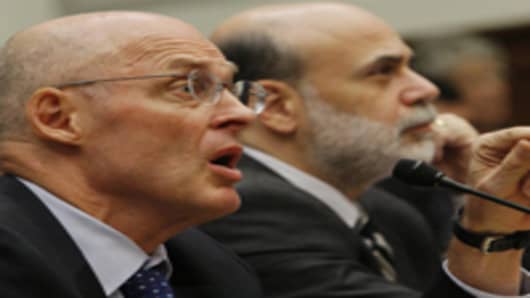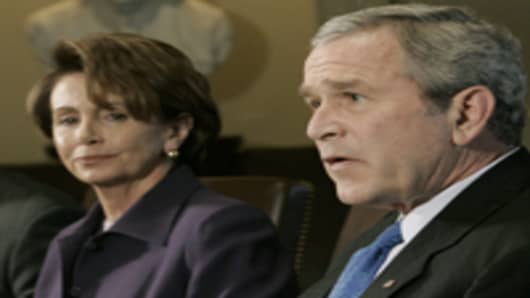The US government's handling of the financial crisis is looking a lot like its response to Hurricane Katrina three years ago, say crisis management experts and former government officials.
In this case, it's the economy that's under water—and people are losing their houses due to foreclosures, not flood waters.
The government was behind the curve from the start, these experts say. Communication was poor and organizational efforts were slow and often ineffective.
"The government acted as if it was initially on top of it and knew it was doing the right thing," says Jonathan Bernstein of Los Angeles-based Bernstein Crisis Management. "It came out later that they clearly didn't."
No one escapes blame either. Congress, President Bush, Fed Chairman Ben Bernanke, Treasury Secretary Henry Paulson and even House Leader Nancy Pelosi—all made key mistakes, the pros say.
"As a result," Bernstein says, "far more damage occurred than if they had been honest, organized, compassionate and understood the threat and didn't get into a position to respond to it before it was too late."
First and foremost, the government was unprepared, even if the crisis was unprecedented and snowballed in ways no one could ever imagine.
"The administration didn't seem to have a plan prior to this," says Neil C. Livingstone, Chairman and CEO of ExecutiveAction, which represents CIS countries, large companies and sports and entertainment figures. "Surely someone should have been tasked with some contingency planning."
He says Exxon was heavily criticized for its handling of the Valdez oil spill in the early going because its executives "did not seem engaged."
The government has been paying for that critical misstep at the start and has since compounded the problem.
"When you are slow to respond to a crisis, you get deeper in the hole, and the longer it takes to dig yourself out," says Larry Smith, a former press secretary for Sen. Dan Quayle who runs the Institute for Crisis Management, a consulting firm representing religious and educational groups, as well as companies.
That slippery slope is partly illustrated by the number of measures being used and apparent shifts in strategy, which have sometimes failed to manage market expectations, causing stock market selloffs.
"When it's absolutely predictable that there is going to be an emotional reaction that is damaging, the best thing you can do is be proactive," says Bernstein, who's clients include Fortune 100 companies.
He says effective communication must be prompt, honest, compassionate, informative and interactive.
"You need to deal with feelings before you address the facts," says Bernstein. "You need to give enough information for people to work with."
More broadly, Smith cites three elements to managing a crisis: operations, communications and recovery. "They're still stumbling around with the operational part."
Lawrence White, a former White House economist and savings and loan regulator, doesn't fault the administration on the organizational side, saying, "you can't create an organization overnight," but calls the communications effort "close to abysmal."
He cites Treasury Secretary Paulson's inability to successfully explain the purpose of the $700 billion reverse auction and generally articulate clearly what the government's strategy and why it had ruled out the alternatives.
"What hurt them dearly was saying, 'Write me a $700 billion blank check and trust me,'" says White, now a professor at New York University's Stern School of Business.
Livingstone says Paulson's call for quick approval "smacked of panic", a definite no-no in crisis management.
Paulson and company then lost more credibility by suddenly pushing a banking recapitalization plan. "It now feels like a plan du jour, It doesn't feel comprehensive and coherent," says White.
"If I was advising anyone involved in this, I would not be premature in asserting the total solution," says legendary public relations executive Howard Rubenstein. "I would have made it clear we're in a volatile situation."
Experts say communication must also accentuate the positive, even as it acknowledges the negative.
Some of the talk—whether on the floor of Congress or at news conferences—is hurting confidence.
'I don't think it helps to go out and say over and over again, 'This is a big problem,'" says former FDIC Chairman William Isaac. "That's very scary to people."
All those interviewed also say officials need to do a better job talking to Main Street and taxpayers, not Wall Street and big investors. But like most top executives, they can't easily identify with those groups.
"They may be doing some of the right things but they are not doing a good job of communicating," says Smith.
That said, there's also such a thing as too much communication.
Isaac, who ran the FDIC in the 1980s when the so-called Latin American debt crisis threatened major US banks, says, "there has been too much talk by everyone involved in the crisis, including the president. I think we need to just chill out a bit. We're not going to talk our way out of this crisis."
Or, as Rubenstein says of government officials. "Sometimes they get into a pickle and they don't know how to get out of it, so they keep having news conferences. I'm not in favor of over-stating your position."
Rubenstein says the current government now has a better grasp of the facts, has learned some important lessons along the way and is becoming better at managing the crisis.
But he and others say it will be the next government and president—which will have a popular mandate to fix the problem, as was partly the case with the S&L crisis of the late 1980s—that will have an impact.
"No matter what happens in the next 19 days, it isn't going to do much," says Smith.






